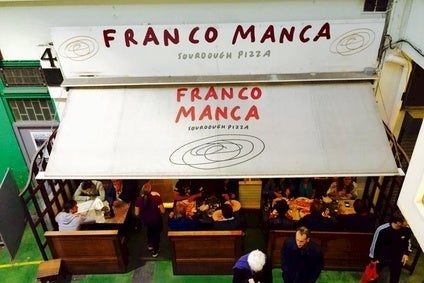Fast-casual outlets are a small part of the UK's restaurant trade – but the sector is growing rapidly, with sales growth outpacing the number of locations opening. Technomic's David Henkes argues fast casual is set to take off in the country.
George Bernard Shaw's quip the United States and Great Britain are two countries separated by a common language might apply to the words we use for some foods – especially chips, which you might take to mean French fries but makes me think of crisps.
But plenty of things about the US restaurant industry translate perfectly to the UK, especially the growth potential for fast-casual restaurants, which have dominated foodservice in my home country for years. The same appealing price points and service style are likely to entice British consumers looking for something between fast food and traditional full-service restaurants.
Fast casual is quite young in the UK, with sales of just GBP1.1bn among in the Technomic UK poll of the top 100 restaurant brands in 2014. But the segment already has impressive momentum, with an 8.6% increase in turnover last year. The sales growth even exceeded the 5.7% increase in UK fast casual locations last year, suggesting average sales per unit are also expanding at a healthy pace.
While that makes fast casual a relatively small part of the UK's GBP31bn restaurant industry, it also means there is tremendous potential for growth in the segment and virtually limitless upside. The field is about to get crowded very quickly, however, as homegrown fast-casual chains like Pret a Manger will soon be competing for retail space and consumer attention with American brands making their way to the market.
In this column, I’ve already discussed the so-called "better burger" chains eyeing the UK but other fast-casual segments will be targeted as well, including Mexican and pizza. For instance, in September, American fast-casual brand MOD Pizza announced a joint venture with Sir Charles Dunstone and Roger Taylor to bring the concept to the UK, with the first location expected to open in London by mid-2016. Dunstone, founder of Talktalk Telecom Group, and his partner operate 30 units of Five Guys Burgers and Fries in the United Kingdom and plan to expand that fast-casual burger chain in France.

US Tariffs are shifting - will you react or anticipate?
Don’t let policy changes catch you off guard. Stay proactive with real-time data and expert analysis.
By GlobalDataTwo practices stand out among the fast-casual brands succeeding in the UK so far, which can be found in their American counterparts as well.
The first is a narrowed focus on a limited menu, which saves brands time and money by simplifying operations and minimizing needs for retail space and equipment. It also helps chains differentiate from the competition with a signature menu item, such as at The Meatball Shop in the United States, a six-unit brand that uses its namesake meatball as a canvas for experimenting with different proteins and new flavours.
Having fewer menu items puts a premium on customisation, which consumers continue to love in the United States and, increasingly, in Europe. This personalisation trend works to great effect at Chatime, which has 11 locations in the U.K. despite entering the market only in 2012. Consumers can choose from one of several Taiwanese-style bubble teas and pick the toppings and sweetness level they want in their drinks.
Another key practice for fast-casual success is honest sourcing. Providing more seasonal or locally grown ingredients fits with consumers' changing definitions of health, and the success of a concept like London's salad specialist Chop'd bears that out. Being able to tell the story about where food and ingredients come from satisfies a big consumer demand.
But fast casuals don't need to get everything from organic or hyperlocal sources, as long as they have a good food story to tell that lends credibility and authenticity. Take British chain Franco Manca, for example, which can crank out a personalized Neapolitan pizza in under a minute. Some of its ingredients are sourced from the UK, but many of its commodities crucial to baking a genuine Neapolitan pizza come from Italy, like Sicilian extra-virgin olive oil and San Marzano tomatoes.
On my side of the Atlantic, the fast-casual segment has been the dominant story of the restaurant industry for several years, posting double-digit gains in sales and locations even though it is a mature sector with some giant players. Britain's roster of fast-casual companies is not as deep as that for the United States – yet – but Technomic nonetheless is forecasting serious expansion in this part of the UK foodservice industry.





